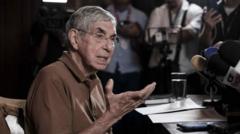Former Costa Rican president and Nobel Peace Prize winner, Oscar Arias, announced that his US visa has been revoked, a decision he learned of weeks following his public criticism of Donald Trump. Comparing Trump’s conduct to that of a Roman emperor, the 84-year-old Arias voiced his bewilderment at the lack of explanation from US authorities regarding this sudden decision.
During a news conference held in San José, Arias recounted receiving a "terse" email from the US government, which did not specify the grounds for the cancellation. He speculated that it might not be a direct decision by President Trump but rather one made by the State Department, hinting that his past diplomatic relations with China could be a factor.
Arias notably shifted Costa Rica's allegiance from Taiwan to China in 2007, a move that earned him both praise and criticism. Presenting his views to the media, he stated, "I established diplomatic relations with China. That, of course, is known throughout the world.” During Trump's administration, efforts to restrain China’s influence in the Western hemisphere have intensified, with accusations directed towards several Central American governments for fostering relations with Beijing.
Coinciding with Arias’s visa revocation, other political figures in Costa Rica have also faced similar actions. Notably, three members of Costa Rica's national assembly opposing President Rodrigo Chaves’s exclusion of Chinese enterprises from the country's 5G development have seen their visas canceled, suggesting a broader pattern of political retribution linked to the current administration's stance towards China.
In a February social media post, Arias criticized the current Costa Rican government's alignment with the US, claiming, “It has never been easy for a small country to disagree with the US government, less so when its president behaves like a Roman emperor.” He emphasized an era when his administration did not receive directives from Washington, asserting the sovereignty of Costa Rica in international matters. As scrutiny around US-Costa Rica relations continues, Arias's experience sparks discourse on diplomacy and political agency within the region.


















